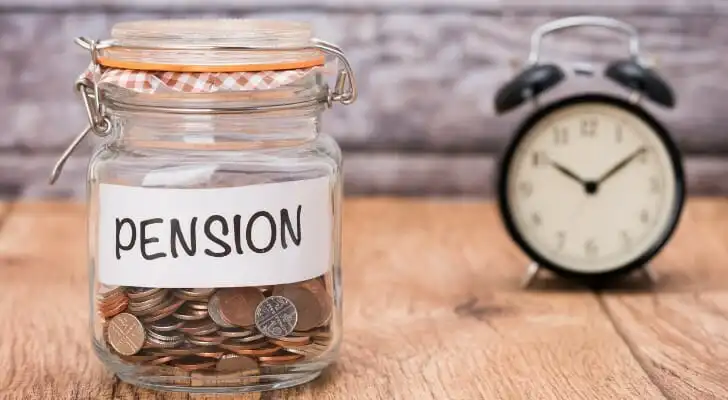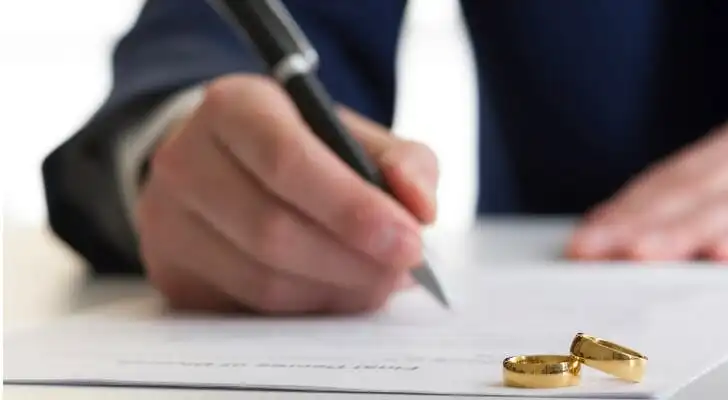A divorce is an unfortunate time in anyone’s life, as it signifies the end of a once cherished relationship. However, it’s important to understand the financial ramifications of a divorce as you’re going through one. So if you’re in the process of filing for divorce, the fate of your assets, including a pension, is likely at the forefront of your mind. There are several different ways that this situation could unfold. Here’s what you need to know.
A financial advisor can help you create a financial plan for your needs and goals before and after a divorce.
How a Pension Is Handled During a Divorce
A pension earned by one spouse is usually considered a joint asset, as are other retirement accounts, such as 401(k)s, 403(b)s and IRAs, although state laws govern the latter. Usually, whatever is earned or acquired before the marriage remains separate property, while what is earned or acquired during the marriage is considered a joint asset.
However, the division of a pension in a divorce isn’t always a cut-and-dried situation. For one, unless you are actively receiving a pension (and thus know the exact details of the payment amount and frequency), it can be difficult to pin down its exact value.
Additionally, while a pension is usually considered a joint marital asset, that doesn’t mean it’s always split 50/50. The exact amount varies according to each state’s law and how much of the pension was earned during the marriage. Remember that if you and your spouse signed a prenuptial agreement protecting your pension, it’ll remain yours.
If you have a military or government pension, these are governed by their own specific set of rules and may not be subjected to the same rules when splitting your assets in a divorce.
Laws Surrounding Pensions and Divorce

If you have a pension, you’ve likely heard of the Employee Retirement Security Act of 1974 (ERISA). This is the set of regulations that protect pension holders. However, 1984 brought the Retirement Equity Act, which protects spousal benefits as they relate to pensions.
To gain access to a percentage of your pension, your spouse would have to specifically ask for their share at the time of the divorce, not at the time of your retirement. This is done via a court order called a qualified domestic relations order (QDRO).
If your spouse is entitled to half or a portion of your pension, it would be withdrawn at the time of the divorce settlement and transferred into their retirement account, usually an IRA.
State Laws for Pensions in a Divorce
A general rule of thumb when it comes to splitting pensions in divorce is that a spouse will receive half of what was earned during the marriage. However, this depends on each state’s laws governing this subject.
In equitable distribution states, assets (like your pension) are divided fairly, as determined by a judge – but this doesn’t necessarily mean 50/50. The vast majority of states are equitable distribution states. But there are also a few community property states, where all marital property is simply divided 50/50.
There are only nine community property states – Arizona, California, Idaho, Louisiana, Nevada, New Mexico, Texas, Washington and Wisconsin. Other states, including Alaska, Florida, Kentucky, Tennessee and South Dakota, allow spouses to opt into a community property system.
Can My Ex Claim My Pension Years After Divorce?
Whether an ex-spouse can claim part of your pension years after a divorce largely depends on what was outlined in your divorce agreement. In many cases, pensions are considered marital property, meaning they must be divided according to state law and the terms negotiated during the divorce. If your settlement or court order specified that your ex is entitled to a portion of your pension, they may still have a legal claim, even decades later, when you begin receiving benefits.
However, if the divorce agreement clearly states that your ex has no right to your pension, they generally cannot come back later and request a share. The key document in these situations is often a Qualified Domestic Relations Order (QDRO), which details how a pension is to be divided and ensures the plan administrator pays benefits correctly. Without a QDRO, or if pension rights weren’t addressed at all, legal disputes can arise, and courts may need to determine whether an ex-spouse is still entitled to a portion.
In fact, the ability to make such a claim depends on several factors:
- Original divorce agreement: If the divorce decree explicitly states that the pension is to be divided, the ex-spouse may still have a claim, even years later.
- State laws: Some states have statutes of limitations on claims against retirement assets, while others may allow claims to be made at any time.
- Implementation of QDRO: If a QDRO was not implemented at the time of the divorce, the ex-spouse might still be able to file one later, depending on the court’s approval and the plan administrator’s policies.
Because these rules vary by state and depend heavily on the original divorce terms, it’s wise to review your settlement documents and consult a family law attorney if questions come up. Understanding the specifics of your pension and your agreement can help you protect your retirement income and avoid unexpected conflicts down the line.
Tax Consequences of Splitting a Pension in Divorce
How a pension is taxed after divorce depends on who gets the payments. If one spouse keeps the full pension and the other gets different assets, only the pension holder pays taxes on the income later. But, if the pension is split, each person pays taxes on their share when they start getting payments.
Timing also matters. Pension benefits aren’t usually taxed until distributions start, which may be years after the divorce. That can affect future tax brackets, especially if the receiving spouse is drawing other sources of income at the same time. Couples should account for this delay when negotiating settlements, as it can change each party’s long-term tax exposure.
If a lump-sum buyout is used in place of dividing future payments, that payout might come from other taxable assets like investment accounts or cash reserves. This can trigger immediate tax consequences, depending on how those assets are liquidated or transferred. Reviewing the tax cost of any trade-off is important before finalizing an agreement.
The Power of Bargaining During a Divorce
If you have a pension and are in the midst of a divorce, don’t just fork over half blindly. You may have a few bargaining chips on your side. First, find out if your soon-to-be ex has a retirement of their own. If it’s comparable to yours in value, it may behoove both of you just to call it even. After all, think of the money you’ll save on lawyers alone.
Second, if your spouse doesn’t have a retirement account that’s equal to your pension, consider other joint marital assets that you may be able to offer them instead. Real estate would be your best choice here. In lieu of splitting your pension, try offering up your former home or another piece of comparable real estate.
It’s important to think through the laws, how they benefit you and what you might need to do to set yourself up for success during a divorce. Know what to expect and what value you can give up to get what you need.
Bottom Line

When facing a divorce, your spouse will generally be entitled to some of your pension. How much your spouse will receive varies, as the laws governing pensions in divorce settlements vary by state. If you have a pension and are getting a divorce, you can still do things to protect your financial interests. For instance, familiarize yourself with your plan and its details. The more you know before drawing up a settlement, the better. You can also hire an attorney with experience in pensions, or you could consider a QDRO specialist. And lastly, don’t automatically assume that you’ll lose half your pension. This isn’t always the case since most settlements are based on what was earned during the marriage.
Because pension division follows specific legal rules, expert guidance often plays a role in how these assets are addressed during divorce.
“Pensions are an extremely valuable asset for those who are fortunate to have one, often making them a target in divorce settlements. Marital laws in your state and whether you have a prenup or postnup will dictate how your pension gets divided. If you’re someone entitled to part of a former spouse’s pension, you’ll need to consult an attorney and submit a qualified domestic relations order. You’ll avoid immediate taxes — and get a clean break from your joint financial life — by rolling your funds into an IRA,” said Tanza Loudenback, CFP®.
Tanza Loudenback, Certified Financial Planner™ (CFP®), provided the quote used in this article. Please note that Tanza is not a participant in SmartAsset AMP, is not an employee of SmartAsset and has been compensated. The opinion voiced in the quote is for general information only and is not intended to provide specific advice or recommendations.
Retirement Planning Tips
- A financial advisor can help you create a financial plan for your retirement needs and goals. long-term retirement plan. Finding a financial advisor doesn’t have to be hard. SmartAsset’s free tool matches you with vetted financial advisors who serve your area, and you can have a free introductory call with your advisor matches to decide which one you feel is right for you. If you’re ready to find an advisor who can help you achieve your financial goalss, get started now.
- Whether or not you have to split your pension in a divorce, knowing how far your current savings will get you in retirement can help you plan. SmartAsset’s comprehensive retirement calculator can give you a detailed look at how your savings stack up.
Photo credit: ©iStock.com/Avosb, ©iStock.com/eclipse_images, ©iStock.com/clubfoto
